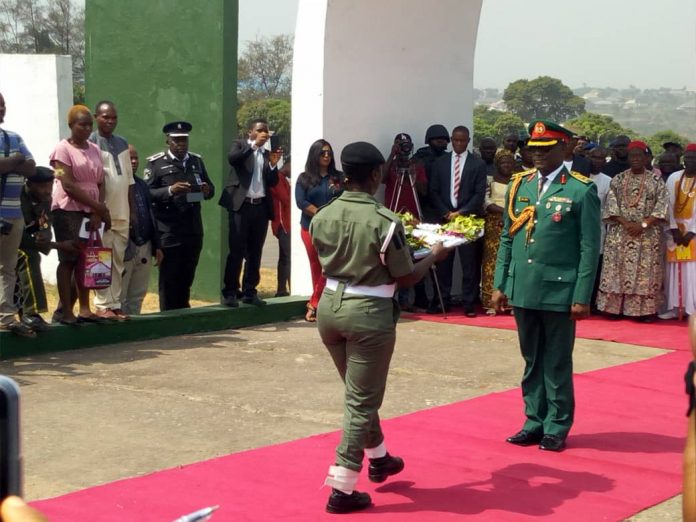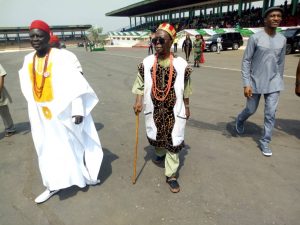… Event severely delayed due to late arrival of Anambra State governor, with the state governor away on vacation in the United States
By Kenechukwu Chukwudi, Awka Times Guest Reporter, with additional desk research
This year marks the 50th anniversary of the end of the Nigerian Civil War, a war fought between the government of Nigeria and the secessionist state of Biafra from 6 July 1967 to 15 January 1970. The cessation of hostilities was marked when leaders of the Biafran forces surrendered to the federal troops. Biafran forces at the time were led by Philip Effiong, the deputy to General Chukwuemeka Odumegwu Ojukwu, the Biafran leader who went into exile in Côte d’Ivoire.
▲ AP Interview With Gowon on July 1, 1967
The final theaters of the war came on 7 January 1970 as Nigerian forces launched an offensive named “Operation Tail-Wind” in which the 3rd Marine Commando Division led by Col. Olusegun Obasanjo attacked Biafran forces, supported by the 1st Infantry division and the 2nd Infantry division. With the concerted offensive, the Biafran towns of Owerri fell on 9 January 1970, and the strategic Uli town fell on 11 January.
A few days before the final federal offensive, Ojukwu had been forced to flee into exile, flying off to Côte d’Ivoire (then Ivory Coast) and instructing his deputy Philip Effiong to handle the Biafran surrender.
▲ Biafran deputy leader, Philip Effiong, surrenders to Gowon, Jan 13, 1970
Effiong surrendered to General Yakubu Gowon of the Federal Army on 13 January 1970, at Dodan Barracks, Lagos. The surrender paper was signed on 14 January.
On the day of the surrender, Effiong said the following, according to an AP news file reported in the New York Times of 16 January 1970:
I, Philip Effiong, do hereby declare: I give you not only my own personal assurances but also those of my fellow officers and colleagues and of the entire former Biafran people of our fullest cooperation and very sincere best wishes for the future.
It is my sincere hope the lessons of the bitter struggle have been well learned by everybody and I would like therefore to take this opportunity to say that I, Maj. Gen. Philip Effiong, officer administering the government of the Republic of Biafra, now wish to make the following declaration:
That we are firm, we are loyal Nigerian citizens and accept the authority of the federal military Government of Nigeria.
That we accept the existing administrative and political structure of the Federation of Nigeria.
That any future constitutional arrangement will worked out by representatives of the people of Nigeria. That the Republic of Biafra hereby ceases to exist.
▲ Gowon interviewed on the day of Biafran surrender
Though January 15th is not the exact date when the war ended, it was the date in 1966 when the first military coup, led by Major Kaduna Nzeogwu, took place in the country culminating in the death of many including the then Prime Minister, Abubakar Tafawa Belewa and host of other civilian and military leaders, and became one of the major reasons for the civil war.
The Armed Forces Remembrance Day may be said to be an occasion which evokes deep feelings of loss in the former Biafran territory, reviving tales of the civil war, especially the pain, destruction and the death of loved ones and a shattered dream. It is a day in which Nigerians as a whole seek to remember the fallen heroes who paid the supreme price for the unity the country, which remains fragile even to this day.
The Remembrance Day was marked in Awka, the capital of Anambra State, at the Alex Ekwueme Square. At the venue were gathered officers and men of the Nigerian Army, Nigerian Navy and para-military organizations such as the Nigerian Police Force, the Nigerian Security and Civil Defense Corps (NSCDC), the Federal Road Safety Corps (FRSC). There were also traditional rulers, representatives of several organizations and members of the general public as the Armed Forces Remembrance Day was being marked.
At the event, guests were seated as early as 10am but the ceremony – usually a brisk and solemn affair with military parade and other rituals concluding within an hour – could not commence due to absence of the special guest of honour, the governor of Anambra state, Chief Willie Obiano. The deputy governor of Anambra State, Dr. Nkem Okeke, was meant to represent the governor who has been out of the country since the end of last year.
The usual tradition of guests such as military and para-military chiefs, Speaker of the State House of Assembly, state Chief Judge and others mounting the dais for salute could not hold due to the absence of the special guest. All those present, including retired soldiers and officers who make up the Nigerian Legion, waited for hours until a few minutes past 1pm when the deputy governor finally arrived. With his arrival, the ceremony started in earnest.
The singing of the national anthem and an inspection of guard mounted by 120 soldiers and commanded by nine officers quickly commenced as soon as the deputy governor arrived. The ceremony of wreath-laying at the foot of the unknown soldier(s) followed thereafter, intended to honour the fallen soldiers who paid the supreme price for the unity of the country. The wreath was laid by the deputy governor, Dr. Nkem Okeke.
Apart from the deputy governor’s, wreath-laying was also performed by the State House of Assembly speaker, Hon. Uchenna Okafor, the state Chief Judge, Justice Ijem Onwuamaegbu, the Commissioner of Police, Mr. John Abang, the traditional ruler of Okpuno, Igwe Sunday Okafor, military chiefs from the 302 Artillery Regiment, Onitsha and Nigerian Naval Outpost, Ogbaru. The event climaxed when a widow of a departed soldier knelt to lay her wreath, evoking emotions among those present. This was followed by a twenty-one gun salute and the blowing of the last bugle signaling a farewell to the dead soldiers.
The deputy governor, in his speech, eulogized officers and men of the Nigerian Armed Forces, praising them for paying the supreme price for the unity, security and prosperity of the Nigerian nation. He said no amount on earth could compensate for the price they paid. He also said that the state government is doing a lot to secure the lives and property of Ndi Anambra, noting that this has yielded positive results, evidenced by the volume of investment that is pouring into the state and by peaceful coexistence within the state.
Some members of the public interviewed by Awka Times applauded the choice of January 15th as a Remembrance Day for the Armed Forces, given its importance in Nigerian history. One of them, Kenechukwu Arinze, noted that although the 15 January 1966 putsch is sometimes perceived as an Igbo coup, given the number of Igbo officers involved, it was in reality a revolutionary coup which had a pan-Nigeria agenda but was not properly executed. He said that those who took part in it should be remembered as heroes who wanted a better Nigeria.
▲ HM Eze Uzu II, Gibson Nwosu, arriving at the event
The traditional ruler of Awka, HM Eze Uzu II Obi Gibson Nwosu, who actively participated in the war as the second in command in the Biafran Airforce, was also present at the event. He had laid the wreath on behalf of traditional rulers in previous years.




